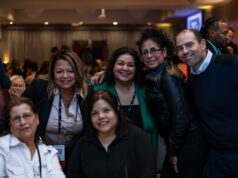
For the past 18 months, essential workers have been lauded across the country-their praises heard in the exuberant clanging of pots daily at 7 pm daily in NYC, in recognition of those who’ve put their own health and safety at risk to keep others and the economy up and running.
A broad swath of essential workers who occupy low-wage jobs are immigrants. Yet, undocumented immigrants working in food and agriculture, health care, and other essential industries have been ineligble for government aid.
And in Green Bay, Latino immigrants have faced barriers when seeking Covid care and safe work settings during the pandemic.
Karina Sanchez, a volunteer for immigrant rights organization Voces de La Frontera (VDLF), says she faced unjustifiable scrutiny when going for a COVID test at a pharmacy in Green Bay. Sanchez said the attendant questioned Sanchez about her health insurance and her ID.
“She asked me if I had health insurance. I said no. She said they were only taking people with health insurance or that I’d have to pay,” Sanchez said. The attendant also wouldn’t accept Sanchez’s ID from the Mexican Consulate as valid. When Sanchez said that she wanted to speak to a supervisor, that being insured wasn’t a requirement for a test, the attendant left her station and returned, offering Sanchez a test.
“When a human being knows their rights and how to exercise them, they’ll understand you,” Sanchez said.
After hearing of similar experiences, she brought her concerns to VDLF. Voces staff began contacting clinics and hospitals to provide service in Spanish. They communicated that the form of identification one presents or one’s lack of a health care plan must not inhibit testing access.
Sanchez and other Voces volunteers also provided Latino community members with more information about vaccinations.
“I see a big difference now. The community now has the correct information about vaccinations. Above all, it’s about removing fear,” Sanchez said. According to data from the Wisconsin Department of Health Services, Latinos are .7 times as likely to get vaccinated as whites, while African Americans are .6 times as likely to receive a vaccine across the state.
In addition to facilitating vaccinations, improving working conditions for front line workers has been a priority of VDLF advocacy. Latinos occupy a central place in the food and agriculture labor force at all stages of food preparation including meat processing — for example, Latinos make up about 18 percent of the American population, but 31 percent of the food production workforce, according to the Bureau of Labor Statistics.
Meatpacking facilities have been the site of several Covid outbreaks, one of the largest occurring at a Smithfield plant in South Dakota, where immigrants and refugees from around the world worked. According to a report by the National Academies of Sciences released in December of 2020, six to eight percent of all US COVID cases were connected to livestock facilities.
“Livestock processing poses a particular public health risk extending far beyond meatpacking companies and their employees,” the report’s authors stated, emphasizing the prevalence of community spread.
At the onset of the pandemic, Tomás Hernán was processing beef at an American Foods plant in Green Bay, where he had been working for 20 years. (Tomas Hernán is a name created for this story, as the source preferred to remain anonymous)
“In March there was a delay of three weeks before masks were given out, and at that time many people got infected. That’s when the alarm sounded,” Hernán said. Though employees there worked in close proximity and without adequate protection, Hernán and his colleagues felt they needed to stay at work.
“We have to be there as essential workers, to provide sustenance. People have to eat,” he said.
Hernán first noticed his sense of taste diminish mildly in September of 2020 but thought that it might’ve been due to a common cold, and he opted to continue working. While his symptoms were mild, his wife also fell ill and needed to be rushed to the emergency room. There, she learned that she had COVID and pneumonia. Hernán also tested positive and subsequently went into quarantine with his wife; both recovered fully.
Concerns about workplace conditions at American Foods and another facility, JBS, were made known to Voces de La Frontera. Sanchez said she shared this information with the organization after a friend had contacted her worried about going to work. VDLF initiated a complaint with OSHA-the Occupational Health and Safety Administration-and sent letters to JBS Green Bay, American Foods and to public officials demanding protocols that would protect workers. Concerns expressed included inadequate PPE, working in close proximity, and keeping employees uniformed about positive cases. Ultimately Voces was able to secure two weeks of paid sick leave from and COVID testing for exposed employees.
Sanchez and Hernán both said that while the campaign was successful, undocumented immigrants working in agriculture have little if any protection from exploitation and work months at a time without overtime pay. Both recently participated in a nine-day march from Milwaukee to Madison in support of essential workers, as part of a national #WeAreHome campaign demanding a pathway to citizenship for undocumented immigrants.
“We work in the hardest sectors of the economy, where they don’t ask for social security numbers. We deserve the same rights as citizens. We move the economy forward,” Hernán said.




























